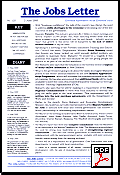



|
 |

|
| No.242 | 14 November 2005 | Essential Information on an Essential Issue |
of key events over the last few weeks. UNEMPLOYMENT LINK IN PARIS RIOTS JOBS AND THE BIRD FLU JOB GROWTH SLOWING ENERGY PROJECTS STRUGGLING FOR STAFF WORKPLACES AND PARENTS OTARA CULTURAL HUB MINIMUM WAGE RISE PSA CONCERNED BY “RAZOR GANG” NZ COMPARED TO OECD WORKPLACE LEGISLATION FOR OZ FAREWELL TO ROD DONALD  LAST Letter
LAST Letter
NEXT Letter   Download this issue as a PDF file
Index to Features
13 October 2005The Australian unemployment rate rises to 5.1%. 14 October 2005UK employers face a shortfall of information technology workers with advanced networking skills. Consulting firm IDC says that without investment in training and education, the UK will be short of nearly 40,000 network professionals by 2008. Research indicates such a shortfall could damage business competitiveness in the UK, hold back economic growth and hinder the adoption of advanced technologies. 17 October 2005The Creating a Culture of Full Employment Conference is being hosted by the University of Newcastle in NSW on 8-9 December 2005. The full programme and abstracts are available here. 18 October 2005The Labour Party forms a government with the support of New Zealand First and the United Future Party. The government says it will lift the minimum wage from $9.50 to $12/hr by 2008. 19 October 2005The National Maori Students Tertiary Association says the lack of a universal student allowance is having a negative impact on Maori student participation and achievement at tertiary level. The association calls for the government to implement a universal students allowance. 20 October 2005The International English Language Test System is too tough and is an ineffective tool for qualifying immigrating teachers, according to Wellington College. Principle Roger Moses believes even many New Zealand-born teachers would find the test too difficult and applying the tests to immigrants is keeping good teachers from working in NZ schools. An international survey finds skills shortages in family-owned businesses are worldwide. Grant Thornton International says 30% of businesses surveyed cited lack of skilled workers as a key constraint on their ability to expand. Russia topped the list with 53% and NZ was second with 52% of family-owned businesses saying they are constrained by lack of skilled staff. Oil industry investor and analyst Matthew Simmons warns Canadians that natural gas prices may double or even triple this winter. Simmons says hurricane damage to oil industry infrastructure in the Gulf of Mexico is severe and he expects "significant product shortages" this winter. Most North American houses are heated with natural gas. 21 October 2005Many Wellington business people still say skill shortages are curtailing their businesses' ability to expand. A Sherwin Chan and Walshe bi-monthly poll found 35% of respondents having vacancies for skilled staff. And nearly 60% said their ability to expand was being hit by skill shortages. Sporting and community groups are experiencing a chronic lack of volunteers and many blame increasing work demands and financial pressure on parents for their reluctance and inability to commit to volunteering. Severe flooding near Gisborne causes millions of dollars of damage to crops and farms. 24 October 200524% of Wellington businesses say that higher fuel prices have caused them to raise their prices, according to a Dominion Post survey. 29% of respondents say they are planning to increase their prices in the near future to compensate for the increase in fuel prices. 25 October 2005National MP Judith Collins is allocated her party's shadow welfare portfolio. National's former welfare spokesperson, Katherine Rich has responsibility for economic development. Business confidence drops as the National Bank Business Survey finds 55% of businesses expect general business conditions to worsen in the next year. 26 October 2005150 jobs may go as Carter Holt Harvey signals its Rainbow Mountain sawmill near Rotorua may be shut down. The cuts would be further to the 80 "greenmill" jobs the company already said it will axe by the end of the year. The Medical Students Association says a well-resourced training programme for undergraduate students could play a significant role in recruiting NZ-trained doctors to work in rural areas. President elect Xaviour Walker days a long-term solution for the depleting number of rural doctor services would be for the government to cover costs — including accommodation, transport and payment to supervising GPs — for seven week rural placements for all undergraduate medical students. Qantas will cut 3,200 of its 6,900 engineering and maintenance workforce unless it gets "worker concessions", according to The Australian. Microsoft plans to increase its European workforce by 2,000 next year to promote new products. 28 October 2005The Green Party co-leader Rod Donald urges NZers to "Buy Kiwi Made" instead of imported goods in the light of NZ's record $5.8 billion trade deficit. Donald says the import of consumption goods has increased by $1,999 million and by Ministry of Economic Development figures, this represents over 14,000 full time NZ jobs. The Green Party's "Buy Kiwi Made" campaign aims to build awareness of the employment, economic, environmental and social benefits of buying locally produced goods and services. 29 October 2005One in five police investigations in Auckland go unassigned according to the Weekend Herald. The newspaper paints a picture of an over stretched police force in which managers have no choice but to "suspend or abandon" work on commercial burglary crimes such as repeat break-ins, fraud, theft from cars and shops and criminal damage. The Marsden Point oil refinery is considering a $500 million upgrade that would create hundreds of jobs in Northland. NZ Refining has commissioned a $25 million study to decide whether a full upgrade should go ahead. A decision is expected by the end of 2006. 31 October 2005Canadian universities launch a consultation process on Canada's workforce challenges. The key concerns include outsourcing of jobs, technology changes outpacing skills, and an aging population contributing to a shortage of skilled workers. The Pathways to Prosperity discussion paper aims to create a national skills strategy. A website has been launched to gather public input here. 1 November 2005Auckland bus fares increase by 10%. Bus company Stagecoach says the rises reflect the rise in diesel prices and higher wages costs. South Korea's unemployment rate rises to 4%. 2 November 2005A sustained rise in the price of oil to $70 per barrel next year would shave 1% off the NZ gross national product, according to a report by the Australian Bureau of Agricultural and Resource Economics. NZ imports a very large proportion of its oil products. 3 November 2005The "Campaign for the Future of Nursing" gets underway with a recruitment drive to find at least 2,000 nurses. The initiative aims to encourage NZers to choose nursing as a career. 4 November 2005The Mongrel Mob gang's "Notorious" chapter in Mangere has started a labour hire business called Rent A Bro. The group does painting, demolition or other work. Leader Roy Dunn says they are setting the venture up to create employment for their kids. 6 November 2005Sudden death of Green Party co-leader Rod Donald, at age 48. The NZ Air Force has signed-on about 100 Royal British Air Force staff following a recruitment drive in Britain. The NZ Air Force is also targeting Air New Zealand engineering staff who have recently been told they are to be redundant. 8 November 2005The Stats NZ labour cost index indicates wages rose by 3.1% over the last year, the largest annual rate since the series began in 1992. 10 November 2005The NZ unemployment rate drops to 3.4%, the lowest level in 23yrs.
 LAST Diary
LAST Diary
NEXT Diary 
|
UNEMPLOYMENT LINK IN PARIS RIOTS France declared a state of emergency after 12 days of rioting, looting, mayhem and
destruction raged across the country. The lawlessness has been fanned by ingrained poverty and joblessness in
low-income housing estates that ring Paris and other large French cities. Gwynne Dyer, in the
New Zealand Herald says these depressing concrete high-rise housing estates have become "the dumping ground
for everyone who hasn't made it in the cool 21st-century France of the urban centres". France declared a state of emergency after 12 days of rioting, looting, mayhem and
destruction raged across the country. The lawlessness has been fanned by ingrained poverty and joblessness in
low-income housing estates that ring Paris and other large French cities. Gwynne Dyer, in the
New Zealand Herald says these depressing concrete high-rise housing estates have become "the dumping ground
for everyone who hasn't made it in the cool 21st-century France of the urban centres".
The low-income neighbourhoods are mostly white French working-class mixed with immigrants from France's former colonies in Arabic-speaking North Africa and sub-Suharan black Africa. Dyer discounts the assertion the riots are race-based, pointing out that about half the young people burning cars and buildings are white, working-class, post-Christian French — who get along fine with black and Muslim kids. These are the people who would have formed the next generation of the French working class but who have found they are no longer needed in that role and they have no future. They are not politically organised but they are very angry. The riots were sparked by the accidental deaths of two teenage Muslim boys hiding to avoid a police identity check. But the festering social conditions ignited rage amongst thousands of lower-class young people across dozens of suburbs and towns radiating from Paris right down to the Mediterranean and up to Normandy. Almost all the violence has been focused on property, with hundreds of cars being torched every night. These injustices are the lack of decent jobs, decent housing and an equal chance at social mobility for a significant section of the French population. Unemployment is these communities is as high as 30% — over three times the national average. And the jobs that are available tend to be menial. Abdel Rahman Bouhout, head of the Muslim Cultural Association in Clichy-sous-Bois, the suburb where the violence initially erupted: "People are under pressure, they feel the anger of no jobs and no chance to improve their lives until finally—boom! — it just explodes." Source — New Zealand Herald, 8 November 2005, "Rioting kids of all colours" by Gwynne Dyer; Boston Globe, 6 November 2005, "Youths' poverty, despair fuel violent unrest in France, Islamic underclass vents frustration", by Colin Nickerson and Petra Krischok; Globe and Mail, 7 November 2005, "The fiery rage of immigrant alienation" by Susan Sachs.
JOBS AND THE BIRD FLUThe Ministry's co-ordinator of pandemic planning Steve Grazier says it is a matter of when, not if, such a virus will arrive in New Zealand and predicts it will be a "very, very significant" event. Grazier: "Even if it is only 40% of the workforce, you can imagine that will have a devastating effect on commerce and factories." Many businesses would stop trading abruptly while others will grind to a halt. Supermarkets would be hard pressed to continue normal operations. Places where the public normally meets — pubs, restaurants, cinemas, clubs — will probably just close down. And as the resulting cashflow slows or stops, many businesses could face bankruptcy and be unable to re-open. Businesses are being urged to make contingency plans to cope with a reduced workforce. The Sunday Star Times reports that MED is considering urging all employers to explore how they could shut down their businesses for at least a week during the most contagious part of an epidemic. Virologist Dr Lance Jennings points out that if is a human to human avian flu reaches New Zealand, all the schools will be shut and parents are going to have to look after their children at home. Jennings: "Companies need to think about how they are going to manage with reduced staff." If the predicted tens of millions of people around the world are affected by sickness, the international economic implications are immense. The World Bank estimates a human influenza pandemic could cost the industrialised economies alone US$550 billion. Some overseas economists are predicting economic turmoil unseen since the Great Depression of the 1930s, with massive unemployment and national economies slashed. Source — NZPA, 21 October 2005, "Bird flu's economic consequences"; Dominion Post, 31 October 2005, "Flu could lead to legal landmine"; Sunday Star Times, 16 October 2005, "Be ready for flu, firms told"; Sydney Morning Herald, 20 October 2005, "NZ govt plans to combat bird flu:, New Zealand Herald, 21 October 2005, "Borders will close in case of pandemic" by Martin Johnston; New Zealand Herald, 2 November 2005, "Cabinet to look at bird flu powers" by Helen Tunnah; Reuters, November 2005, "Bird flu could cost rich nations $815b; The Press, 15 October 2005, "Facing the flu" by Anna Claridge".JOB GROWTH SLOWING Job growth is slowing. The Department of Labour says employment growth declined
from 4.4% in late 2004 to 3.0% in June 2005. And it predicts job growth to slow further to 1.5% in
2006 and to 1.0% in 2007. The Department says a weak export sector as well as the strong New
Zealand dollar, high oil prices, rising interest rates and slower population growth are continuing to push
job growth figures down. Job growth is slowing. The Department of Labour says employment growth declined
from 4.4% in late 2004 to 3.0% in June 2005. And it predicts job growth to slow further to 1.5% in
2006 and to 1.0% in 2007. The Department says a weak export sector as well as the strong New
Zealand dollar, high oil prices, rising interest rates and slower population growth are continuing to push
job growth figures down.
Skill shortages seem to have plateaued after hitting a 30-year high earlier this year. But staff shortages are still very high on an historical basis with 43% of firms reporting having increased difficulty finding skilled/specialist workers. The Department expects unemployment to remain below 4% for another year but predicts it will begin to rise after 2006. — Labour Market Outlook — October 2005, published by the Department of Labour, can be downloaded (8pg, 187Kb) from here.
ENERGY PROJECTS STRUGGLING FOR STAFFFitzroy Engineering, the biggest New Zealand contractor on the $1 billion Pohokura gas field in Taranaki, has created 100 jobs, two-thirds of them for tradespeople. The company is actively recruiting people from all around New Zealand and is now negotiating to bring in tradespeople from Malaysia to meet the shortfall. Managing director Peter Robinson-White says the company has had to train a lot of staff to get the required skill levels and there is still a lack of experienced project managers and engineers. Robinson-White: "There is, perhaps, more work than the industry can handle." Source — Dominion Post, 5 November 2005, "Thinking bigger" by Marta Steeman.
WORKPLACES AND PARENTS A fifth of women returning to paid work after being on parental leave go back to
lower-level jobs than they had before they left to have their baby, according to the Equal Employment
Opportunities Trust (EEO). An online survey completed by 4,475 parents revealed the women changed to
lower-level positions to get more flexible or part-time hours or because their previous job was no longer
available. EEO chief executive Philippa Reed says the survey confirms that many parents find it hard to juggle
paid work and parenting and feel unsupported by their employers. A fifth of women returning to paid work after being on parental leave go back to
lower-level jobs than they had before they left to have their baby, according to the Equal Employment
Opportunities Trust (EEO). An online survey completed by 4,475 parents revealed the women changed to
lower-level positions to get more flexible or part-time hours or because their previous job was no longer
available. EEO chief executive Philippa Reed says the survey confirms that many parents find it hard to juggle
paid work and parenting and feel unsupported by their employers.
The survey also found that many New Zealand bosses are still not giving working parents the flexible hours that they want. Many parents want more paid and unpaid special leave to look after sick children, flexible time-out during the working day for family events and appointments, suitable spaces in workplaces to bring sick children, more before and after-school care and school holiday care. Source — New Zealand Herald, 1 November 2005, "Parental leave ticket to poorer job for many", by Simon Collins; Dominion Post, 1 November 2005 "Parents plead for flexible employers" by Sue Allen.
WORKING VISAS FOR PACIFIC PEOPLESClark told the Port Moresby Chamber of Commerce and Industry that New Zealand has a particular shortage of seasonal workers, with 40,000 places needing to be filled each year. Many of these jobs are being filled by people coming from offshore as working holiday makers — from Europe and other developed nations. People from the Cook Islands, Nuie and Tokelau already have open immigration access to New Zealand and there are permanent residency quotas for several Pacific countries. But reciprocal working holiday visa arrangements are negotiated bilaterally and to date haven't included Pacific countries. Source — NZPA, 26 October 2005, "Australia and NZ differ on seasonal workers" by Maggie Tait; The National, "NZ ready to help"; Solomon Star, 1 November 2005, "Howard rejects `labour mobility'" submitted by Arthur Wate.
OTARA CULTURAL HUBThe Trust also aims to link Otara's unemployed young people into the fast-growing industrial area in neighbouring East Tamaki. Although the number of people on the dole in the region has dropped significantly over the last five years, Brown says too many young people are still coming out of school without the skills they need to go into the available jobs. A challenge the Trust is taking up is to get young people to stay at school longer and then to go on to polytechnic or university to accumulate the skills they need to get and keep a job. Source — New Zealand Herald, 4 November 2005, "Otara to revive tourism initiative" by Simon Collins; letter from Rodger Smith, 4 November, "re Mayors Taskforce/Employment Catalyst Fund".
MINIMUM WAGE RISECouncil of Trade Unions chief executive Ross Wilson says we need to accept that people working in places like supermarkets are entitled to a living wage. And Wilson discounts the concern that a rise in the minimum wage will be inflationary or discourage employers from taking on new staff. He points out that the minimum wage rose 36% over the last six years and has not affected inflation. And the unemployment rate dropped steadily over the period. Wilson says the minimum wage rise is an important step in boosting the economy but the rise needs to happen alongside programmes to train workers for higher skilled jobs. Source — Dominion Post, 19 October 2005, "170,000 to benefit from wage rise" by Adrian Bathgate; National Business Review, 20 October 2005, "CTU" $12 minimum wage would be good for NZ".
PSA CONCERNED BY "RAZOR GANG"Source — Dominion Post, 21 October 2005, "Razor gang talk alarms PSA" by Vernon Small; Media release Public Service Association, 20 October 2005, "Urgent clarification sought on state sector spending review"; New Zealand Herald, 21 October 2005, "PSA seeks urgent meeting over razor gang" by Kevin Taylor.NZ COMPARED TO OECD
Source — New Zealand in the OECD, October 2005; Dominion Post, 29 October 2005, "NZ keeps up with the Joneses of the OECD" by NZPA.
WORKPLACE LEGISLATION FOR OZAustralian Labor Party spokesperson Stephen Smith says it won't be just the unemployed moving from job to job, it will also be the four million Australians who are having their unfair dismissal rights taken away by the same legislation. Smith "What we end up with is people being forced onto inferior wages, inferior conditions and the great risk is that we end up with a working poor just like as you find in the United States." Source — Dominion Post, 25 October 2005, "New rules leave jobless no choice" by Fairfax, AAP.FAREWELL TO ROD DONALD The nation has been stunned and saddened by the sudden death of Green MP and
co-leader Rod Donald. Parliament was suspended Thursday last week to allow MPs to travel to the funeral
in Christchurch. In celebration of his leadership and advocacy for Green principles, Donald's casket
was carried to Christchurch Cathedral in an electric-powered city bus with a cortege of hundreds
of bicyclists. The nation has been stunned and saddened by the sudden death of Green MP and
co-leader Rod Donald. Parliament was suspended Thursday last week to allow MPs to travel to the funeral
in Christchurch. In celebration of his leadership and advocacy for Green principles, Donald's casket
was carried to Christchurch Cathedral in an electric-powered city bus with a cortege of hundreds
of bicyclists.
Rod Donald was the country's most passionate and articulate advocate for New Zealand as a sustainable nation. He promoted many practical ecological schemes ranging from recycling, organic agriculture and solar energy alternatives. He also championed the drive for electoral reform in this country, a campaign that led to the MMP system that brought great variety of New Zealanders into the house of representatives. Rod Donald was also a public entrepreneur who led many initiatives in community economic development, job creation schemes, fair trading networks and Buy NZ-made campaigns. His energy, enthusiasm and pragmatism in pursuing these alternatives has brought praise and support from across the political spectrum. Rod was also a long-time friend and supporter of the Jobs Research Trust and The Jobs Letter. We'll miss him. Our thoughts and condolences go to his family, his Christchurch friends and his parliamentary colleagues.
|